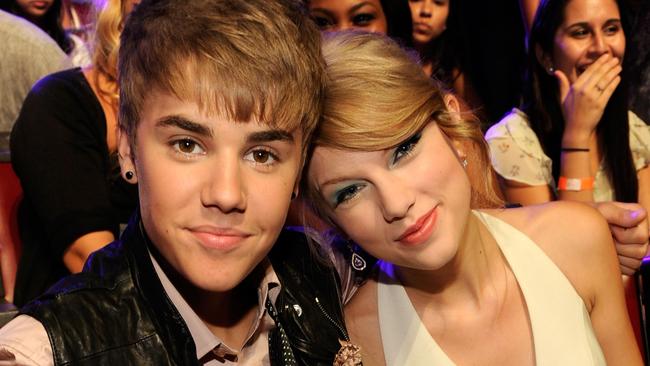Swift rages against Big Machine as label is sold
Scooter Braun buys Taylor Swift’s former label and the superstar’s peeved.

American singer-songwriter Taylor Swift has exposed the murky machinations of the pop music business by spectacularly unloading on her former label, Big Machine Records, which has been sold for more than $US300 million ($429m).
In a post on social networking website Tumblr yesterday, Australian time, Swift outlined what she called her “worst case scenario”: Big Machine has been purchased by a company owned by artist manager Scooter Braun, whose clients include pop singers Justin Bieber and Ariana Grande.
Swift’s seven-paragraph spray — boosted by her 119 million Instagram and 83 million Twitter followers — implicated some of the biggest names in global entertainment while portraying herself as a “sad and grossed out” victim of underhanded business practices.
“Some fun facts about today’s news: I learned about Scooter Braun’s purchase of my masters as it was announced to the world,” she wrote. “All I could think about was the incessant, manipulative bullying I’ve received at his hands for years.”
Swift went on to describe an “illegally recorded snippet of a phone call” that was orchestrated and leaked by Kim Kardashian — partner of hip-hop artist and producer Kanye West, a former client of Braun’s and long-time rival of Swift’s — followed by bullying on social media by Bieber and West. As well, she mentioned West’s “revenge porn music video which strips my body naked”.
Braun’s company Ithaca Holdings — which includes interests in music, television, film and technology — announced its purchase of Big Machine Label Group yesterday, Australian time, with The Wall Street Journal putting the sale price at more than $US300m.
Big Machine was founded in 2005 by Scott Borchetta, a former Universal Music record executive. The independent label’s first signing was a 15-year-old Swift, who began her career as a country singer-songwriter before pursuing a glossy pop sound that made her one of the world’s most popular artists.
Her six albums with Big Machine — from her 2006 self-titled debut to 2017’s Reputation — have sold more than 31 million copies in the US, according to Billboard, while 40 of her singles have achieved platinum accreditation in the US.
Sales and streams of Swift’s music made up 34.6 per cent of Big Machine’s market share last year, Billboard reported in October, ahead of country acts on its roster such as Florida Georgia Line and Rascal Flatts. In November, Swift left Big Machine to sign with Universal Music, the world’s biggest music company. Under the terms of her multi-year, multi-album deal, the 29 year-old will retain ownership of her intellectual property — unlike the contract she signed as a teenager, which stipulates that her recordings are owned by Big Machine.
“When I left my masters in Scott (Borchetta)’s hands, I made peace with the fact that eventually he would sell them,” Swift wrote on Tumblr. “Never in my worst nightmares did I imagine the buyer would be Scooter.
“Any time Scott Borchetta has heard the words ‘Scooter Braun’ escape my lips, it was when I was either crying or trying not to,” she wrote. He knew what he was doing; they both did. Controlling a woman who didn’t want to be associated with them. In perpetuity. That means forever.”
Given her global popularity with younger listeners, Swift’s missive — in addition to putting her side of the story across in clear language, without intermediaries — will also have the side-effect of educating her audience about the inner workings of the pop music business, whose true nature is often obscured by glamour and spectacle.
The ability for an artist to negotiate ownership of their master recordings, for instance, is a perk reserved for only a handful of superstars — and usually only after they have proven their commercial success. As the singer-songwriter Prince put it in a 1996 New York Times interview: “If you don’t own your masters, your master owns you.”
Late yesterday, Borchetta responded to Swift’s claims in a post online, where he quoted amiable text messages between himself and Swift following her decision to leave his label.
“Taylor had every chance in the world to own not just her master recordings, but every video, photograph, everything associated to her career,” Borchetta wrote. “She chose to leave.”
On Instagram, Bieber posted a photograph of himself and Swift to his 114 million followers while defending his long-time manager.
“Scooter has had your back since the days you graciously let me open up for you,” he wrote. “As the years have passed we haven’t crossed paths and gotten to communicate our differences, hurts or frustrations. So for you to take it to social media and get people to hate on Scooter isn’t fair.
“Neither Scooter or I have anything negative to say about you. We truly want the best for you. I usually don’t rebuttal things like this but when you try and deface someone I love’s character (sic) that’s crossing a line.”
After her post was published on Tumblr, Swift’s loyal audience has been tweeting its support while popular artists such as singer-songwriter Halsey lined up behind her.
In concluding her post — which also pointed to her first album for Universal, Lover, to be released on August 23 — Swift wrote: “Thankfully, I am now signed to a label that believes I should own anything I create. Thankfully, I left my past in Scott’s hands and not my future.
“And hopefully, young artists or kids with musical dreams will read this and learn about how to better protect themselves in a negotiation,” she added. “You deserve to own the art you make.”




To join the conversation, please log in. Don't have an account? Register
Join the conversation, you are commenting as Logout